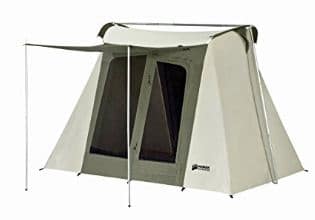Canvas tents vs. Polyester tents: which is better? This is a hard question to answer because both tents have their pros and cons with polyester tents often better for short-term camping while canvas tents are amazing for long-term use or semi-permanent campsites.
No one should be surprised by the fact that Jon and I are huge camping fans. If there’s one thing that has hit home during these trying times, it’s how much each of us miss past super-rural places we lived where camping on out of the way areas and social distancing was no problem at all.
Getting the right tent for your specific needs is going to take a little bit of research, but we can help you along the way.
However, the setting of the enjoy the quiet and calm of Mother Nature at her very finest is not simply a case of packing up the car and trailer with food and sleeping bags – some more detailed planning is required. One of the first things you are going to have to consider is your choice of tent.
For first time buyers of a tent – or for those who are considering replacing an older model with something new two types of tent are often under consideration – the one is manufactured using man-made material – Polyester and the other with natural material – Cotton canvas.
But before you make that all-important decision there are certain things to bear in mind – each of these types of tent has both pros and cons.
Table of Contents
Polyester Tents: Pros & Cons
Let’s first take a look at Polyester tents. these tents offer a variety of advantages over canvas tents – but they do have some weaknesses.
First the Polyester tents are highly rain resistant. This makes them perfect for use in climates where the weather is unpredictable. The synthetic material is also highly resistant to shrinkage. If you are storing your time for extended periods shrinkage can be a problem – especially with natural materials such as cotton.
Shrinkage can cause problems in fitting the tent material to the frame – and nothing will be more frustrating or put a damper on your outdoor experience than having to struggle to erect your tent using a material that simply will not fit over the frame.
Another advantage of Polyester material is that is is almost impervious to rot. Natural materials can rot, especially when they have been subjected to adverse weather conditions such as rain or snow.
Storing canvas in a warm environment without first drying it is a recipe for rot – and this can seriously affect its weatherproofing and in severe cases can render the tent completely unusable.
In fact, when surveyed the number one reason that campers who own canvas tents are looking for a replacement is due to the effects of rot and mold.
However, there may be a serious downside to using a synthetic material like polyester for the manufacture of tents – it simply does not breathe well. It’s often a case of balancing superior waterproofing with the fact that polyester tents do not allow for the easy circulation of air in the tent due to the tightly knit nature of the man-made material.
However that said, many manufacturers have taken great strides towards mitigating the problem with cleverly placed vents and windows – so it is not as much of a problem as it has been in the past.
Polyester Tent Pros
- Lightweight
- Great strength and stretch
- Easy to maintain
- Good cost
- Very good waterproofing as well as mildew and mold resistance
- Wide variety of tent styles
Polyester Tent Cons
- Can wear down with extended use over years
- Low breathability
- Not heat resistant
- Not UV resistant
Cotton Canvas Tents: Pros & Cons
Now we’ll take a closer look at cotton canvas tents. some of the issues that make them an attractive option have been touched on above, as have some of the weaknesses of this type of material – but expanding on these points will provide the buyer with additional information that will allow them to make an educated choice when it comes to their purchase decision.
There is that issue of breathability. Cotton has a far looser weave than Polyester and therefore Polyester tents need not have a huge number of vents and windows in order for those in the tent to enjoy superior airflow. For many, this is a plus.
Opening and closing vents and windows in adverse weather conditions can be a chose – and in the case of a sudden downpour a lack of extremely quick action can cause those using a vented Polyester tent to have to deal with soaked clothes and sleeping bags.
Cotton canvas tent material is also extremely soft to the touch. Brushing against man-made materials such as Polyester can be unpleasant – although newer formulations of Polyester have largely eliminated this issue. but the fact remains that the natural fibers that are used in the manufacture of canvas tents provide a more pleasant tactile experience.
It was mentioned above, but is worth repeating – canvas tents are subject to shrinkage especially when stored wet – and they can also rot. extra care needs to be taken prior to storing a canvas tent. In the long warm days of summer, this can be as easy as leaving the tent laid flat outside to allow it to dry thoroughly. But if adverse weather persists drying a large canvas tent can provide challenges.
That said, there are a number of spray on applications that claim to inhibit the growth of mold – and many will also increase the weatherproofing of canvas tents.
One of the most important things to take into account when purchasing a canvas tent is the fact that they are combustible. They catch fire extremely easily. A stray spark or ember blown from a lit campfire can see a canvas tent burst into flames – and that will be the end of your camping trip.
Even more dangerous is the fact that a campfire that is not extinguished properly can quickly rekindle and produce embers – especially in windy conditions – and if the campers are also[eep at the time the result can be disastrous.
Canvas tenets need extra vigilance when dealing with flames, either from external sources such as a campfire of from lanterns inside the tent that use open flame for illumination.
Finally – and this is important for overnight hikers to take into account, canvas tents can be heavy, especially when wet. Polyester tents are far lighter.
Canvas Tent Pros
- Breathable material
- Absorbs moisture
- Good insulation that makes it usable for every season
- High UV resistance
- When properly taken care of can last years or even decades
Canvas Tent Cons
- Heaviest of the tent fabrics
- Can have mold/mildew problems if you don’t clean canvas tents properly
- Bulky
- Requires heavy amounts of maintenance
In Conclusion
When all is said and done the choice of the material you choose for your tent will depend on your needs as far as the camping experience is concerned. There are pros and cons to polyester tents just like there are pros and cons to canvas tents.
Do your research and you will be assured that your camping trip provides that perfect opportunity to recharge tired mental and physical batteries.



